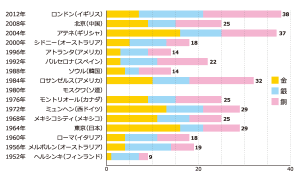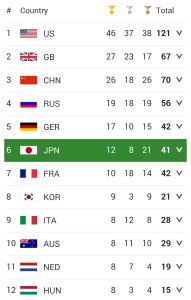All the below links are in English.
弊社ツイッターアカウントの一つ @WSjp_insight のRTによる paper.li 掲載記事4件を貼っておきます。
More on Trade Policy Preferences: The Harvard-Politico Poll | Stephan Haggard @PIIE
英語圏政治経済情報
All the below links are in English.
弊社ツイッターアカウントの一つ @WSjp_insight のRTによる paper.li 掲載記事4件を貼っておきます。
More on Trade Policy Preferences: The Harvard-Politico Poll | Stephan Haggard @PIIE
Here are articles including those concerning the 3rd presidential debate. All the below links are in English.
You can check out the following website for policies: worldsolutions.work
標記第3回(於:@UNLV)などに関する記事を取り急ぎ以下貼っておきます。政策については上記URLをご覧ください。(本投稿一番下に私見を書きました。)
Linguist Geoffrey Nunberg on election language (YouTube) | UC Berkeley School of Information
Post-debate poll: Clinton 49%, Trump 39% (w PDF) | YouGovUS
White House Watch: Down to the Wire? | Rasmussen Reports
How Does the U.S. Stock Market Perform in Election Years? | JEFF DESJARDINS, Visual Capitalist
Presidential Debate: What you missed | Alexander Burns & Matt Flegenheimer, New York Times
Final Presidential Debate: Live Analysis of Clinton vs. Trump | Wall Street Journal
Most Memorable Lines of the 3rd Presidential Debate | ADAM KELSEY, ABC news
Watch: Trump Won’t Commit To Accepting Election Results In Final Debate | JESSICA TAYLOR, NPR
What Went Down In The Third Presidential Debate | FiveThirtyEight
Donald Trump and America’s Incomplete Contract with Itself | Mark Harrison, University of Warwick
Is America collapsing like the Roman Empire? | Barry Strauss, Fox news, CornellCAS
The Axe Files (Podcast): Ep. 88 – Ron Brownstein | David Axelrod, CNN, UChicago Politics
Clinton maintains double-digit (51% vs. 36%) lead over Trump | PRRI/Brookings Survey
Clinton’s Florida Lead Continues to Grow | PublicPolicyPolling
WashU Expert: Losing hurts in partisan politics | Erika Ebsworth-Goold
Covering Immigration and the Election (YouTube) | Stanford CCSRE
Marcus Noland commentary: Trade war would yield Ohio casualties | The Columbus Dispatch, PIIE
The Russian Group Hacking US Elections | Sheera Frenkel, Buzzfeed
THE THIRD PRESIDENTIAL DEBATE: LIVE-DRAWING BY JASON ADAM KATZENSTEIN | The New Yorker
The definitive ranking of presidential (and VP) debate moderators | Carly Mallenbaum, USA Today
A PARLIAMENT OF ELECTION EXPERTS | MICHAEL HARDY, Rice Magazine, Baker Institute
Expert: Rigging the presidential election would be “impossible” | Bailey Harbit, WSAW
私見:10月4日の副大統領候補者テレビ討論会の後、10月7日にトランプ候補の10年以上前の問題発言が公になったのが、大きな分かれ目でしょう。
政治ですから、この時期に公になり火が付いたのは不可思議ということもありません。また、白人既婚女性が対象となるなど限界を超えた感があり、テフロン加工が剥がれたようです。さらに、初の選挙出馬で公職経験も無い挑戦者という立場は、年齢が高くてもフレッシュさは満点で期待を集めますが、強い信頼関係の下で助けてくれる人材が不足し、それを自分の口一つでカバーするというのも限界があります。しかも、その舞台がアメリカ大統領選挙本選という世界最大の選挙ですから、無理なのかもしれません。それでも、既存政治家への不満や不信が国民に渦巻いているとは言え、共和党という二大政党の大統領選挙の予備選挙を勝ち抜いただけでも凄いことではあります。
討論会だけを見ると、多くの勝者投票結果などと異なるかもしれませんが、10月9日の2回目は超逆境ながら何とかやりすごすタフさを見せましたが、1回目は口数も悪態ももう少し大人しくして政策批判や政策主張の中で挑戦者らしく内容や根拠にもっと具体的に踏み込むのが良かったであろうし、3回目の今回は全てに一番新味に欠け全然魅力ある政権を想像させませんでした。他方、クリントン候補は、1回目の特に冒頭は疲れか緊張感があるようにも感じられましたし、2回目も決して楽な感じを受けませんでしたが、相手や場に慣れてくると徐々に底力が出てきたのか、3回目の今回は現職大統領のように全てに強く見えました。
選挙ですから、最後まで予断を許しません。投票により選ばれた大統領が、アメリカ国民に喜ばれつつ日本との一層の関係深化へも進み、両国の共存共栄が深まる、そんな方であることを祈念しております。
Here are a part of articles concerning the presidential election. All the below links are in English.
You can check out the following website for policies: worldsolutions.work.
標記につき関連記事を以下貼っておきます。政策については上記URLをご覧ください。
Lewd Donald Trump Tape Is a Breaking Point for Many in the G.O.P. | @nytimes
Election Update: Women Are Defeating Donald Trump | @NateSilver538
US Election 2016: In Conversation with @EdwardGLuce (w Podcast) | @Jparakilas @ChathamHouse
@ASPI_org suggests | @AmeliaLong222 @davidmlang
Reports of Obamacare’s demise are greatly exaggerated | @crampell @washingtonpost
Putting the Populist Revolt in Its Place | @Joe_Nye @ProSyn
How Trump and Clinton Could Still Draw Undecideds off the Sidelines | @peterwgnd @Columbia_Biz
Trump and American Populism | @ForeignAffairs
How terrible simplicity leads to terrible complexity | @nfergus @BostonGlobe
Does Donald Trump’s plan to drill more oil make sense? | @mattmegan5
Hillary Clinton’s ‘Invisible Guiding Hand’ | @ShaneGoldmacher @Politico
How bad is it for Donald Trump? Let’s do the math | @DrewLinzer @dailykos
Forecasting the Presidential Vote with Leading Economic Indicators and the Polls | @CUP_PoliSci
compilation of the winner of every county in every presidential race since 1836 | @kkondik
How social media is shaping the 2016 presidential election | @mattkapko @CIOonline
Why Donald Trump is a ‘click bait candidate’ and Hillary Clinton is too | @JTakiff @PhillyBusiness
Podesta Leaks: The Obama-Clinton E-mails | @ANDREWCMCCARTHY @NRO
Trump Withheld Alimony From Marla Maples When She Threatened His Presidential Ambitions | @KFILE @BuzzFeed
– “Our purpose was to send a message that she was playing close to the fire. That should slow her down,” Trump’s lawyer said at the time.
Don’t skip the vice presidential debate: Column | @USATopinion
Tocqueville’s America Revisited, Part 1 (w Podcast) | Paul Kennedy & Nicola Luksic @cbc
(The below two links are in English, and the last one in Japanese.)
さて、当サイトでも今後、随時、Brexit につき情報をアップして参ります。
本日は、@ChathamHouse 関係の記事 Japan Lays Out a Guide to Brexit (6 September 2016) | Sir David Warren @CHAsiaProg(’日本がイギリスEU離脱の手引きを示す’)本文と抄訳をご紹介します。
– Britain would do well to embrace Tokyo’s constructive criticism as it prepares for life outside the EU.(EU域外での生き方を準備している日本の建設的な批判を、イギリスは包み込んで受け容れてうまくやっていける)
The Japanese government paper on the implications of Brexit released on 2 September has been described in the UK media as an ‘unprecedented’ and ‘dire’ warning, a ‘stark’ threat, and dismissed as ‘doom-mongering’. In reality, it is a carefully-argued and very detailed analysis of the areas of Brexit-related concern to the thousands of Japanese companies in the UK, and those aspects of the current business environment that they want to preserve in the forthcoming negotiations. Setting out the Japanese stall in this way risks annoying British negotiators with the responsibility of finding their way through the minefield of agreeing the terms of Britain’s divorce from Europe. But the Japanese analysis, used constructively, is an important guide to what really matters in ensuring that a post-Brexit UK is not only ‘open for business’, but a country that the world’s major investors want to do business with.
(9月2日に公表されたイギリスEU離脱に係る日本政府の要望書(下記参考英文)は、’前代未聞’で’切迫した’警告であり’正真正銘’の脅しであるとイギリスのメディアでは伝えられており、’恐怖を利用した’と切り捨てられている。しかし、日本の要望書は、イギリスEU離脱に係るイギリス国内の千単位の日本企業にとっての懸念について、また、今後の離脱交渉において日本企業にとって維持されたい現在の企業活動環境について、注意深く議論されまた非常に詳細に分析したものである。… 建設的に使えば、離脱後のイギリスが’企業活動にとって動き易い’のみならず世界の主な投資者が企業活動をしたい国であることを確保するのに真に問題となる事柄についての重要な手引きである。)
The paper is couched in terms of cooperation and partnership. Japanese inward investment into the UK has been one of the major industrial success stories of the last 40 years, with the 1984 decision of Nissan to build its car plant at Sunderland the turning point. The Japanese government and Japanese companies want to preserve this post-Brexit. But that means keeping radical changes to the current environment that might emerge from the Brexit talks to a minimum. Specifically, the Japanese want, among other things, to maintain current tariff rates and customs procedures, access to skills (including from within the EU), the current provision of financial services (50 per cent of the value of British manufactured goods is accounted for by services), the current arrangements for information protection and data exchange, unified intellectual property protection, harmonized standards and regulations, and access to the EU R&D budget and joint programmes. These requests are aimed at EU negotiators as well as at the UK. A 10-page annex goes into even more detail, sector by sector.
(… とりわけ日本が望むのは、関税率、税関手続き、EU域内も含めた人材へのアクセス、金融サービス条項、情報保護及び… →下記参考(日本語PDF3頁等)をご覧ください)
The context of these requests is not just concern about Brexit. The paper makes clear that leading the free-trade system remains a responsibility shared by Japan, the UK and the EU. The Japanese government are nervously watching the US presidential election, with Donald Trump openly adopting a protectionist line and Hillary Clinton now opposed to the Trans-Pacific Partnership (TPP) trade deal; they will also have been concerned at suggestions from European politicians that the US−EU Transatlantic Trade and Investment Partnership (TTIP) may fail. Hence their statement – echoed by President Obama at the G20 in Hangzhou in his remarks on TTIP – that the priority must be to finalize the EU−Japan Economic Partnership Agreement this year. A post-Brexit UK−EU relationship that erects protectionist walls would, in Japan’s view, be a disaster for everyone. The arguments in the paper are about preserving the health of the global economy.
(要望書はイギリスEU離脱への懸念を示しているだけではない。引き続き自由貿易をリードしていくことが日英欧において共有される責任であることが明確にされている。日本政府はアメリカ大統領選挙を神経質に見守っている。…)
And Japan calls for early clarity and transparency on the difficult issues. The paper argues that uncertainty causes volatility, and warns against the negotiating process producing ‘unpleasant surprises’. This advice may be unwelcome to UK politicians and negotiators who have to work out how to trade off being part of the single market with the need to restrict freedom of movement. This is a political dilemma that needs to be unravelled slowly; Britain’s economic partners’ need for early clarity runs directly counter to the politics which Prime Minister Theresa May and her cabinet have to manage over the coming months.
(そして日本は、難しい案件につき早期の明確化及び透明性を求めている。不確実性が市場の急激な変動を引き起こすと述べ、また、交渉過程が’嬉しくないサプライズ’をもたらすことを警告している。このアドバイスは、単一市場の一部であることと移動の自由を制限することの折り合いをいかに付けるかに尽力せねばならない政治家や交渉者からは、歓迎されないものかもしれない。これは、ゆっくりほどけて行かざるを得ない政治的ジレンマなのであるから。…)
The paper observes that ‘Japan respects the will of the British people as demonstrated in the referendum’ and express confidence that ‘the UK and the EU will overcome . . . difficulties and lay the foundations for the creation of a new Europe’. Nonetheless, the menu of requests is challenging and almost certainly impossible to fulfil in its entirety, if, as the prime minister has said, ‘Brexit means Brexit’. But it is a guide to what foreign businesses, attracted to the UK by successive governments with the promise of being inside the single market in an EU member state committed to further trade liberalization, want from the new arrangements.
(要望書では、’日本はイギリス国民の投票の意思を尊重する’と述べられ、また … にもかかわらず … しかし、これは、外国企業がイギリスの今後の交渉過程において整えてもらいたいことに係る手引きなのである。…)
In that sense, it should also lift the level of current discussion on trade and investment relations away from the zero-sum political arguments during the referendum campaign – ‘being part of Europe’ versus ‘free trade agreements with the rest of the world’. Japan is saying, very clearly, that it is not an either/or choice. If the UK is to remain one of the world’s largest and most powerful economies – which, however much it is talked down in Britain, it still is – it is going to have to have a relationship with the EU that attracts foreign investors. After all, as the paper also makes clear, they have a choice where to invest. It does not have to be the UK.
(この意味では、この要望書は、国民投票キャンペーンで展開されたゼロサムの政治的議論ー’欧州の一部’か’欧州以外の世界各国との自由貿易’かーから、貿易や投資の関係に係る議論のレベルを高めるものである。日本は、非常にはっきりと、どちらかを選ぶ選択ではない、と言っている。もしイギリスが世界で最大最強の経済の一つであり続けるならば、外国投資家を惹き付けるイギリスとEUとの関係を持っているであろう。結局、要望書がこれまた明確にしているように、どこに投資するかの選択の自由があるということである。イギリスへ投資しなければならない、ということではない。)
参考
Japan’s Message to the United Kingdom and the European Union (PDF)
英国及びEUへの日本からのメッセージ(PDF、日本語)
(The below link is in English.)
危機管理は、国家的緊急事態については平時の防災と事態発生後72時間以降の復旧対応の間の事態発生後72時間以内の対処であり、また、国家的緊急事態以外でも事態発生後早い段階での対処を意味します。したがって防災は標題の危機管理には直接は当たりませんが、防災・復旧は危機管理と一体的に平時より十分に準備しておく必要があることから、随時ここで触れていくこととなります。
今日は、ニュージーランドのクライストチャーチ市経済インフラ状況レポートの最新版 Latest Christchurch Economic Infrastructure Situation Report online (see PDF) | @CDCChristchurch @ChristchurchCC @SCIRT_info (#Chch #CDEM #lgnz #ECan #CHC_Airport #ChorusNZ #ufbnz #OrionNZ…) をごく簡単にご紹介します。2011年カンタベリー地震等による被害からの復旧等が記載されており、PDFの総論 General context(p9-21)、水 Water(p23,30,32,34-39)、交通 Transport(p48-50,52-66)、通信 Communications(p72-76,78-79)、エネルギー Energy(p84,87-89,91-94)に本Christchurch市の、その他のページに広域周辺地域及び国の、現状や政策等が記されています。以下、PDF内の図表をいくつか貼っておきます。
All the below links are in English.
弊社ツイッターアカウントの一つ @WSjp_insight のRTによる paper.li 掲載記事5件を貼っておきます。
Why You Should Go Glamping in Slovenia | @voguemagazine @jenrunsworld
Adidas will open an automated, robot-staffed factory next year | @BI_RetailNews
25 Power Words to Drive More Engagement With Your Social Campaigns | @jeffbullas @andrewraso1
Agri is the backbone of NZ economy – over 95% is exported. | @NZTEnews
Irish economic growth of 7.8% tops euro zone again | @RTEbusiness
2016リオデジャネイロ五輪の選手の方々、その他関係の大勢の方々、大変お疲れさまでした。
日本選手が活躍すると、日本国民として嬉しく感じます。


メダルが全てではありませんし、種目数その他の事情もあるのでしょうが、日本の獲得メダル数が過去最多とのこと。
以前ほどじっくり見られませんが、活躍の勢いを感じました。
やはり、金メダル(一位、優勝)は最高ですし、惜しい銀メダルもありましょうし、価値ある三位もありましょう。
負けてこそ、人間的成長が促進される場合もありましょう。団体戦も(エネルギーを相互にもらいながらも)本当に消耗して大変でしょう。
五輪レベルの闘いをしたことがない者が粗雑に私見を言ってしまうならば、
肉体が外国人並みになれば、日本は基本的には
テクノロジーや研究が要求される五輪レベル、世界レベルの闘いで今後益々実力や実績を伸ばせるのではないでしょうか。
メンタルや気合は、仮に強くない場合でも、実力が付き実績が伸びてくれば、徐々に伴って来るはずです。
そして、徐々に全ての層がさらに厚くなり、益々強くなる。
日本の素晴らしい今あるソフトパワーに加えて、実績自体もソフトパワーになる。
問題は、テクノロジー・研究、強い肉体や国民生活などを支える経済力、そして、様々な駆け引きなどを要求しまた経済力を左右する国際政治力ではないでしょうか。
政財学官が一体となって、改革その他により経済力や政治力の強化がなされることを国民として望んでおります。
あくまで参考: Rio 2016 Olympic Games: Medals per capita | @StatisticsNZ など
今日は”サミット”の話、と言っても先月下旬の議長国日本・伊勢志摩G7の話ではありません。〔以下ツイッターリンクは中国の広州市Guangzhouも含めてEnglish、日本の各市町のホームページはそれぞれ。〕
ロサンゼルス市(LA、人口380万人、アメリカ。参考:@MayorOfLA 市長)・オークランド市(AK、市人口40万人強・都市圏人口150万人、ニュージーランド。参考:@Auckland_NZ 市役所)・広州市(GZ、人口1300万人、中国。参考:@Guangzhou_City 市役所)の相互に姉妹都市である三市による Tripartite Economic Summit 2016 三市経済サミット が先月中旬にオークランドで開催されました。21世紀の都市間交流のあり方を打ち立てるべく2014年11月に世界初の三市経済連携協定(Tripartite Economic Alliance agreement)が結ばれ、初回”サミット”が昨年6月にロサンゼルスで開催されたとのことです。
都市間交流・地域間交流は一対一・文化交流という形である印象がありますが、太平洋を跨いだ三大都市の継続的な経済連携枠組みで世界初というのは第一印象としてはインパクトがあります。もちろん細部を少しずつ継続的に理解して行く必要がありますが、民間企業が収益を上げるのに役に立つ経済連携の形を取れば地方公共団体にも(もちろん中央政府にも)予算的労働的に負担がかからないということは言えます。また、人間で言えば、二人の方が突っ込んだ内容を話せるけど三人以上の枠組みの方が派手だったり長持ちしたりもする(あくまで参考:下記※)、というような感じでしょうか。従来型交流と適宜並行して進むと良さそうです。
なお、上記三市の日本の姉妹都市は、ロサンゼルス市とは名古屋市(参考:名古屋市英語ホームページ)、オークランド市とは大阪市(参考:大阪市英語ホームページ)・福岡市(参考:福岡市英語ホームページ)・富岡町(友好都市。参考:福島県富岡町ホームページ。)・宇都宮市(参考:宇都宮市ホームページ)・品川区(参考:品川区英語ホームページ)、広州市とは福岡市、のようです。また、広州市の姉妹都市には、当都市経済連携には入っておらず、ニュージーランドとは隣国かつ同盟国であるオーストラリアのシドニー市(参考:@cityofsydney 市役所)もあり、先月で両市姉妹都市30年になり喜ばしいとの報道が何度か目に入ってきました。シドニー市の姉妹都市には日本の名古屋市もあります。
※ 各人が手抜き無しに努力を怠らないチームの人数は、例えばWhy Less Is More in Teams | Mark de Rond では、4人とされています。他方、適度な頑張りが必要となる姉妹都市経済連携のような組織間の持続的試みにおいては、検証等必要ですが、各者が一定程度以上望んでいれば3者というのが一番長持ちしそうだと第一感では思いました。
本稿の勤務・雇用・経営という大きなテーマについても、基本的には弊社が承る業務の範囲外であるため、深くは触れません。二十年以上に亘って感じてきた点と関連情報を日本語で簡単に挙げておきます。
日本をガラパゴス化・停滞させているのは、正に日本式の勤務・雇用・経営であると感じています。例えば、ネット検索で見つけた出口治明ライフネット生命保険代表取締役会長blog(日本語)は端的に状況を表しており、この原稿から二年半経った今でもさほど大きな変化は無いように定性的には感じられます。企業も政府も組織を動かすのは人間ですから、個々の人間の能力が努力等によって発揮向上されまたそうされ易い合理的な状況ができているようにしておかなければ組織全体が停滞する、というのは論理的です。そして結局、個々の停滞が国全体の停滞となります。さらにざっくり言うならば、この点も定量的検証等が必要ですが、東西冷戦時代の右肩上がり成長の成功記憶がある日本は、今までやってきた延長上でのガラパゴス化に走り易いように感じられます。
そろそろ、まず、社会全体の大きな建前だけは、完全成果主義に一気に変えてしまわないと、個人の能力が伸びず、会社も潰れ、日本経済もさらに停滞するように感じています。成果や能力などを判断するのは人間ですし、組織や業務などによって判断基準ももちろん違うので、一律に同じ方向に同じ速度で変わっていくはずがなく、そこはやはり個別の人間や組織などに任せるしかありませんが。
イギリスのEU残留国民投票(6/23)は、“Why the UK should stay in a reformed EU” 首相と国民との対話集会 でのキャメロン首相の定性的な主張の大筋のとおり、統計の精緻な分析に基づき定量的な説得力を持たせるというのが困難な性質のものかと考えられます。
確かに、EU非加盟国であるノルウェー(参考:Norway & EU & EEA)が国民一人あたりいくら払ってEU市場に入り、いくら売り上げていくら利益が出ている、EU加盟していればそれぞれの額はこうなっている、などと聴衆に訴えられればベストであったとは考えます。しかし、上記性質に加えて、そもそも本来的には、現状をひっくり返すと良くなる点を具体的・明確に示す証明責任はひっくり返したい離脱派にあり、できなければ “論理的には” 離脱派の負けです。
とは言え、政治・投票ですから、論理的或いは科学的に正しい方が勝つとは限りません。そこで、その点を大いに考慮してだと思われますが、あくまでこのビデオ二回と今まで部分的に見た他の映像による個人的印象としては、今まで対峙した各党党首等より非論理的にムードで訴える点でも勝っているように感じます。
今月どのような動きになるか、そして、投票後に投票結果が及ぼす波状的・連鎖的影響も、適宜追って参ります。〔リンクは全てEnglish。UK’s referendum on EU membership | Department of Foreign Affairs and Trade, Ireland に残っている文書も参考になります。〕